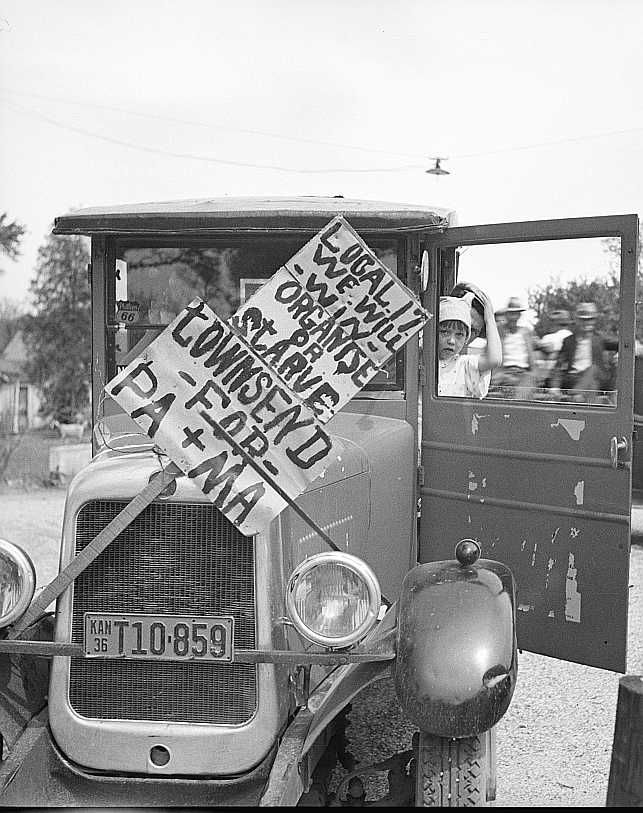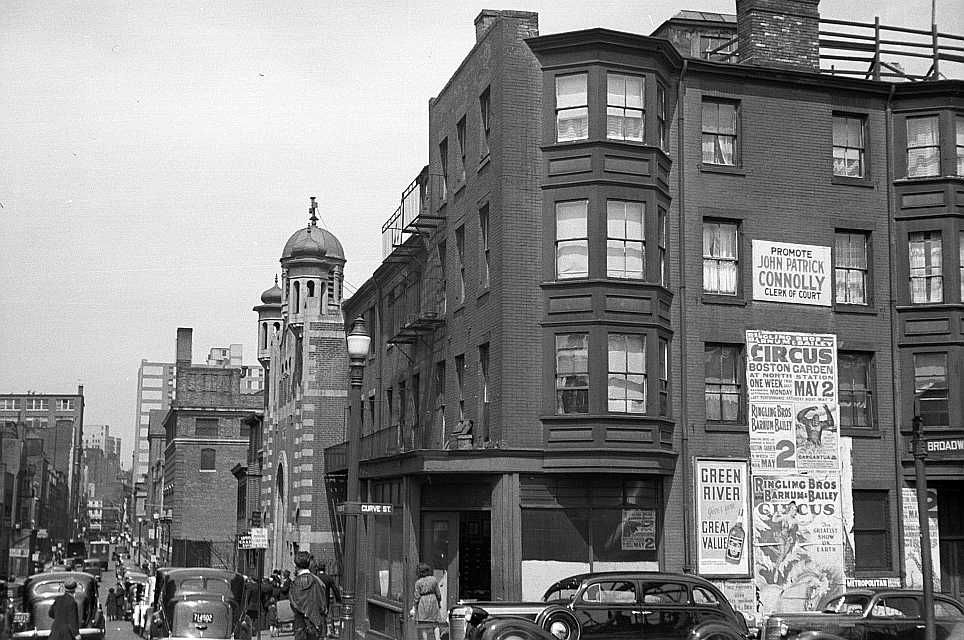
NEW YORK
Anthony Gottler
Graduated 8th grade 1930, age 14
Hoboed at 16 - from 1932 to 1935
I was a Western Union Messenger Boy. I was struck by a truck. Decided to leave home while in hospital dreaming about seeing the country.
I hoboed in 41 states and rode 43 different railroad lines.
In 1935 enlisted in CCC
Traveling around the country under different viaducts and bridges I had my own logo when I had something to write with: TONY THE BUFFALO KID
Most remarkable thing = Finding a $20 bill on sidewalk in Ogden, Utah on my 18th birthday!
NEW YORK
Ed Galvin
Segregation in Transient Camp across river from New Orleans:
In those days segregation in a transient camp meant a line down the center of the camp, red barracks on the right and black painted barracks on the left, and Never the Twain shall Meet. No African-American dared put a foot across the line, even by mistake! To do so would win him accommodation on the road gang, a very unhappy lot!
Transient camp paid 75 cents a week in Florida, $1.00 in Arizona and $1.50 in California.
NEW YORK
Edward Corubia
15, 1933
Chicago World’s Fair. 15 year old runaway. On coming home ...
“My father greeted me and said, ‘Hope you had a nice trip.’ We sat down and ate some apples together.”
NEW YORK
Edward Palatz
1916, Rode 15-18 from 1932 to 1935
On April 1932 my foster parents put me out of their home.
The name Palasz was adopted by me, for I was only in their custody and never adopted. My original name of Olszewski was buried with my parents.
“During my first two week stint at familiarizing myself with the young and old of the road, I rode the Lackawanna, Erie and the Delaware and Hudson RR through the upper parts of N.Y., Vermont, and on their New Hampshire and into the yards of Boston.
While panhandling in Boston I got lucky and wound up at the 4th precinct, station 4 on Washington Street where I met Johnny Houriman, or should I say Sgt Houriman who gave me a blue workshirt and $2.50 bus fare from Boston to NYC.
In Salinas, Kansas I got off a local freight train to bathe and wash my clothes. During my second night in a box car on what we call a siding, my first encounter with one of the local citizens occurred a little before midnight as the local citizen tried to assault me. After this ordeal I slept in a jailhouse for a couple of nights until the next local took me out of Kansas.
Then there was the gentleman in Great Falls, Montana whom I approached and asked for a dime toward a cup of coffee. Here on the steps of the post office for 10 minutes, I listened to a lecture on the economy and how much food we were wasting in the USA. With more money in his bulging pocketbook than I would make in a year, I was awarded a ten cent piece.
Six years later in 1938 I got in touch with Sergeant Houriman while on a ship docked in Boston and paid my debt with interest for a memorable day in late April, 1932.

NEW YORK
Graham Hodges
Reverend Hodges, United Church of Christ
First 19 years of my life were spent in Wesson, pop 800, Mississippi, through which the two track Illinois Central RR went right through the middle of town. Each day saw numerous freight trains, local and non-stop trains.
Like every town and hamlet in America we had our quota of boys and men who hopped freights either for adventure or in quest of jobs. In hard times, more of the latter. Young men would ride freights to the wheat harvests of Texas and Oklahoma and then ride north to Canada, following the harvest jobs.
Please don’t forget to write about the MIA’s of the Great Depression era, the many males and some females, who were killed away from home and buried in nameless graves, killed by railroad accidents. Few ID cards carried back then, especially if a man was running away from something.
Many a woman lay awake at night waiting for a husband, brother or son who never returned. I recall vividly seeing a young man lying on the floor of our little freight station and wondering whose husband or son he was. Local citizens took up an offering to pay for a cheap casket. No national registry of missing hoboes back then. Men we did not know we called hoboes.
I recall how on our customary Sunday afternoon drive we would go see the embalmed body of a young man killed by a freight in nearby Brookhaven. The funeral parlor left his body out each Sunday for possible identification and partly to advertise their embalming skills.
Far more men and boys were killed riding freight trains than in railroad wrecks. Not to mention the army of boys and men with part or all of a limb missing from a freight train accident. Every town had them. Ours was a boy with a missing left arm.
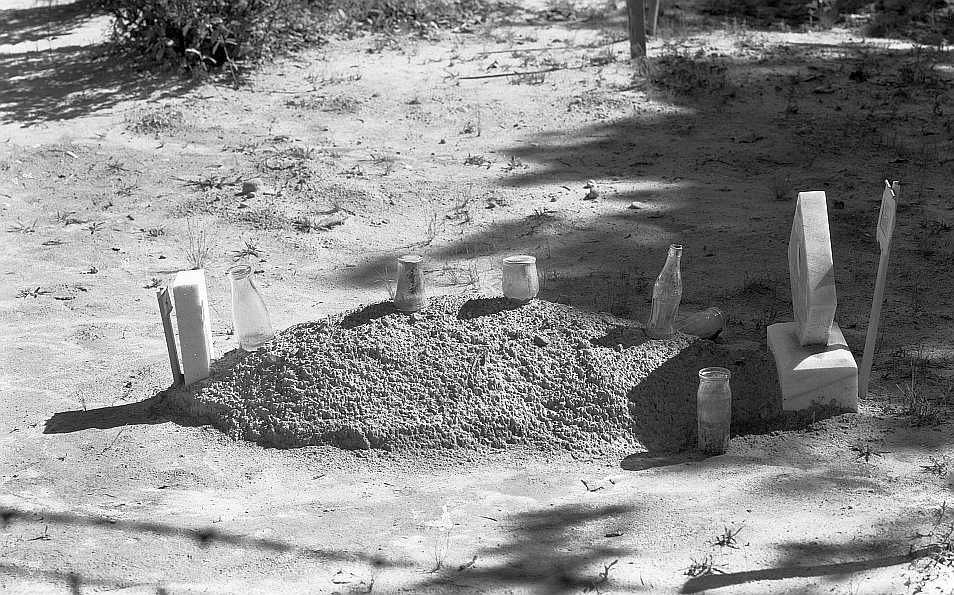
NEW YORK
Henry Siaskiewicz
1931
It was in St. Louis that a couple of neophytes decided to ride in style. We rode behind an engine of a passenger train headed for New Orleans. The night was pitch black and the fireman’s figure outlined vividly as he stoked the fire. The journey was short-lived as the train stopped in a deserted area of Missouri. We were escorted off by a railroad detective.
So on to San Francisco we rode. Unbeknownst to us, train was approaching this long and very low tunnel which was just high enough to accommodate the freight cars, with very little to spare. Facing the caboose we saw the brakeman running toward us waving his arms wildly and motioning for us to get down in the reefer. Luckily it was empty. He cursed us but we were very appreciative.
This courageous man risked his own life to save ours.
NEW YORK
Herbert Teitelbaum
12 to 16, 1930 to 1935
Left because of continual disagreements with my father
Worked when possible on farms, stores, construction projects, a bouncer in a brothel. Slept where possible. Sometimes women would house me. Slept in many hobo jungles and always ate what was available.
Learnt to ride rails the hard way by making many mistakes. Older men were the best teachers.
Most remarkable thing on road: The attitude of people like me. Desperately poor, ragged but always with hope. Could not believe that the country could treat people like they did. The World War One veterans were the most bitter and resentful to what was happening.
Good people: Paul Robeson, who tried to raise money to help and visited some hobo jungles. Father Flanagan who sheltered me when I was sick.
African-Americans were treated very badly by townspeople and police but not by white people riding the rails. Very seldom was there intermingling. There was a mutual tolerance of each other in an atmosphere of abject poverty.
I saw people killed and injured by police, American Legion and VFW in raids at night on hobo jungles and places sheltering the unwanted. In one major event, I was involved as a recipient. It was the "massacre" of homeless hobos and alcoholics at a railroad siding and warehouse in Albany, NY one winter’s night.
It was the means for survival. It made me tough, strong and a loner. It made me, politically, morally and socially, a life long LIBERAL.
I realized that I needed an education and after service in the Spanish Civil War and WW11 I obtained it.
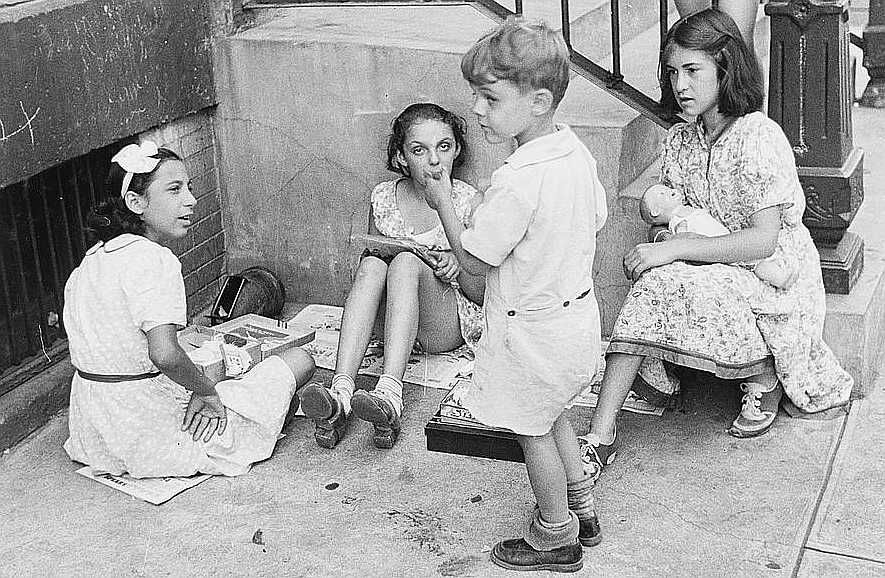
Philip Bonosky
born 1916, Lithuania
Living with family in Duquesne, steel town, 1933, eight children, 3/4 younger
Age 17, 18, 19 riding the rails, looking for work, 1934-1936
"My father made it very clear that we had to take care of ourselves, while he took care of the younger children."
"Only I hung around, big, able, an eater, always reading, getting nowhere, being nothing."
"Took off with brother after panicking at the idea of becoming a mill worker for rest of life."
"We children of steelworkers and coal-miners were not scheduled for the benefits of society. Our job was to give our lives to the children of others; we should work to send them to college."
"A brother (older) was crippled at 22 riding the freight trains. He lost one leg and one foot."
"I, class poet, dramatist, fortune's far-haired boy surely, confronted suddenly the class of '33 standing square-toed on the sidewalk outside the office, callow, raw, useless...
Graduation 1933: "commencement" meant the beginning of education and not the end. That was exactly what was happening that year.
"School for all America had begun in earnest. We were to start learning the realities of our country. Our people and our generation became one of those pivotal generations that come, in periods of crisis and teach both the older generation as well as the younger. They taught their fathers and they taught their sons, for what they learned between 1929-1941 was the truth.
"My life on the boxcars was relatively brief. I wound up in Washington and became a leader of the Workers' Alliance of that city."
"Congress voted an amendment to the WPA which automatically forced off anyone who had been on WPA rolls for 18 consecutive months. Panic and anguish and tragedy of one of episodes around which veil of history is drawn and about which brassy apologists for the American century prefer not to be reminded."
"The idea was that dropping people from WPA rolls would have a 'stimulative moral effect' on their characters and spur them to find a job in modern industry everyone knew didn't exist."
After 90 days of being so stimulated, law allowed them to reapply. Average WPA salary was $60-$70 a month."
America was on the dole and millions of people weren't sure where their next meal was coming from."
"Then the war came and overnight unemployment disappeared."
"One of those rare moments, when life affords you a glimpse of the truth and the truth endures."
Wrote for Story Magazine/ New Masses/ Colliers
"Then McCarthyism hit. Union activist/ blacklisted. I was a non-person. I couldn't publish in USA, but did have some editions in USSR, China and Lithuania. - "The Dry Guillotine.
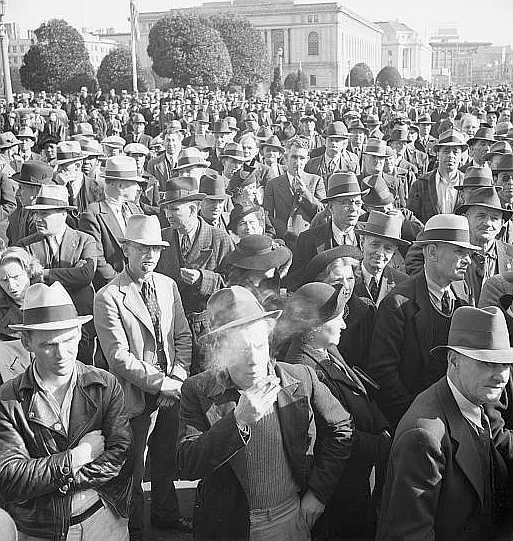
NEW YORK
Romanofsky
We were in our early 20s. Going west from Newport News on
N & W RR.
We were completely green about how to get on trains and where to find them. The first hobo we saw, we asked questions, and to our surprise the young man was going west also. He was looking for work and knew the railroad line N & W RR. He was about 18 and had been searching for work for several years already.
We rode that whole night. At dawn the train suddenly began to slow down and our friend warned of trouble ahead.
The train stopped and suddenly dozens of young people began to pour from the long line of cars. All of us began to run for our lives off the tracks into what looked like 15ft tall weeds. Bullets whizzed through the air as company bulls fired point blank at us from both sides of the train.
We hid in the thick growth and waited till the train began to move away. After some time about ten of us began to walk again on the tracks to a train watering pump.
One of the hobos said we were shot at the worst spot on the line because one of the bulls had a bullet in leg from a previous encounter with hoboes.
“We saw Americans fighting to live and help each other.”
OHIO
Andrew Szabo
Began age 18 in 1932
“Freight trains loaded with hobos: we were like locusts out west.”
I was impressed by the care and honest love afforded a snot-nosed kid. Dumb, naïve and trusting. The hobos of that era were a breed all their own.
I was one of many traveling across the country at no cost to us. We were not bothered just as long as we kept moving.
The care and honest concern shown me will last until I die. A person could sleep and be fed in safety opposed to today when not even your teeth or shoes are safe or life could be snuffed out.
Taught me compassion for my fellow man, the frailty of human life and the value of an honest buck. To question the government, as they are not always honest and right. To think with your God-given brain and evaluate.
OHIO
Charles Stidham
Thank God we had no Hitler. If we would have had different leaders in our politics, our government would have been far different today.
I have been hungry and went without food many times and will not forget about hard times.
The bulls delighted in kicking us off the trains in the middle of nowhere. Their methods were terrible and many a blow was given, sometimes in the middle of the desert and the only choice was to walk the rails to the nearest town.
On one of his trips, my brother Clarence died in Texas at the age of 25.
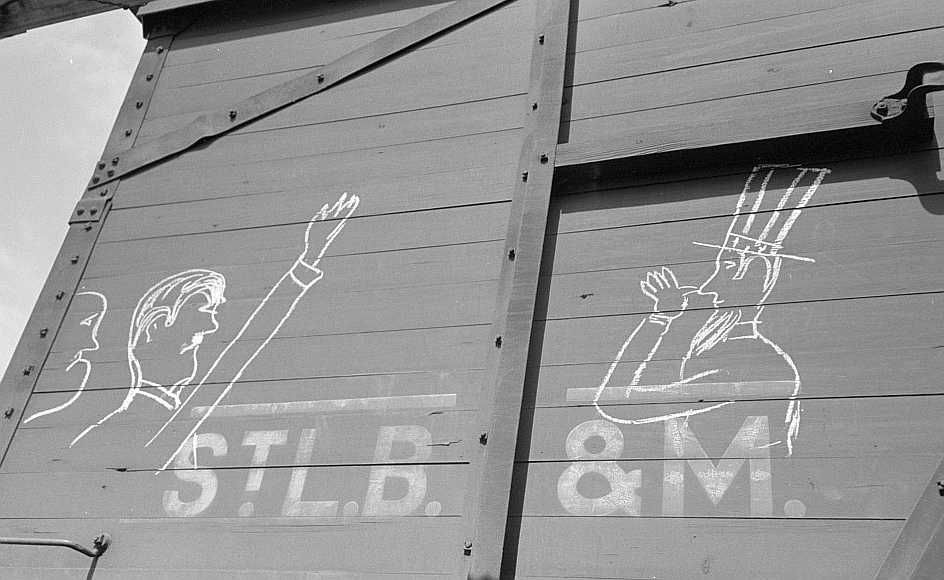
OHIO
Christine Wolfrum
“I am 71 years old but often reflect on the Depression years of my childhood.
My father worked for 17 years in the Kentucky coal mines. He made good money until the Depression came and the mines closed down.
We traveled to Tennessee, Kentucky, North Carolina and Ohio and back to Kentucky.
I was born in Arjay, Kentucky, a small mining town, lived in a company house and shopped at company store. Traveling back and forth looking for work was rough on my brother, who was two years younger, and my mom, who was sickly.
We told our friends we were traveling by bus or train but we were really hitch hiking. You wonder how anyone would pick up a family of four? They did. It was times of honesty and trust, which no longer exist today.
I can remember being so tired and hungry and whining a lot about the ordeal. We were so short of money.
Dad would stop somewhere and buy an unsliced loaf of bread and chunk of cream cheese and just tear off pieces for us to eat.
One time after getting a ride, us out on the road, Dad stopped at a farm to see if they would take us in for the night. The people were wonderful to us, fed us supper of fried chicken, the works, bedded us down. Fed us a hearty breakfast and drove us out to the highway to begin again trying to get a ride.
At times we only had apples from a road side farm to eat – apples lying on the ground.
One never had a reliable place to stay. Always old furnished rooms. We endured rooms in awful condition. Roaches and bedbugs, which kept my mom up many nights trying to keep us from being eaten alive.
Sometimes only one room, where we all slept in one bed, my brother and I at the foot of the bed. It was uncomfortable.
I stood in welfare lines as a teenager to get a bag of flour, or rice or grape fruits, or a jar of soup.
My brother would work at Findlay market in Cincinnati on Saturdays for 50 cents all day and afterwards he would pick through the vegetable markets waste to get fruits or vegetables, cut away the bad and use them to help out at home. Make lemonade from the good halves of bad lemons.
My brother gathered old wood from Findlay market and chopped them up to sell for firewood and would get 10 cents for a child’s wagon load.
My brother and I sold shopping bags on the corner of Findlay market to have a little money to go to a 5c movie. Shopping bags could be bought for 2 cents and sold for 5 cents.
No chance of getting an allowance like kids of today get.
I remember how hard it was and I longed for a sweet roll or donut which we would never dream of seeing. One time my brother and I decided to ask a neighborhood restaurant for their stale rolls. They gave us both not a stale one, but a nice fresh one.
It was hard for us to get school paper money which was 35 cents a year. It would take me all year to get it together a few cents at a time.Teacher would embarrass you constantly asking when you would bring it in. You figured probably never.
There was never any money. All I heard was trouble and hard times.
My mother finally put her foot down when I was 12. We never hitch-hiked again. She bought a few sticks of old furniture from the Goodwill and got a couple of unfurnished rooms. Dad couldn’t find work. So Mom got a job sewing in a factory. Only earned $3.50 a week.
I have a lot of hard time to remember but my life was never dull. I could never know how to appreciate all the luxury things I have had since. I am far from being wealthy, never cared to be; God has supplied my needs and for that I’m grateful.
Now that our country has such massive layoffs and all we hear is bad news I fear we may end up in another Depression…
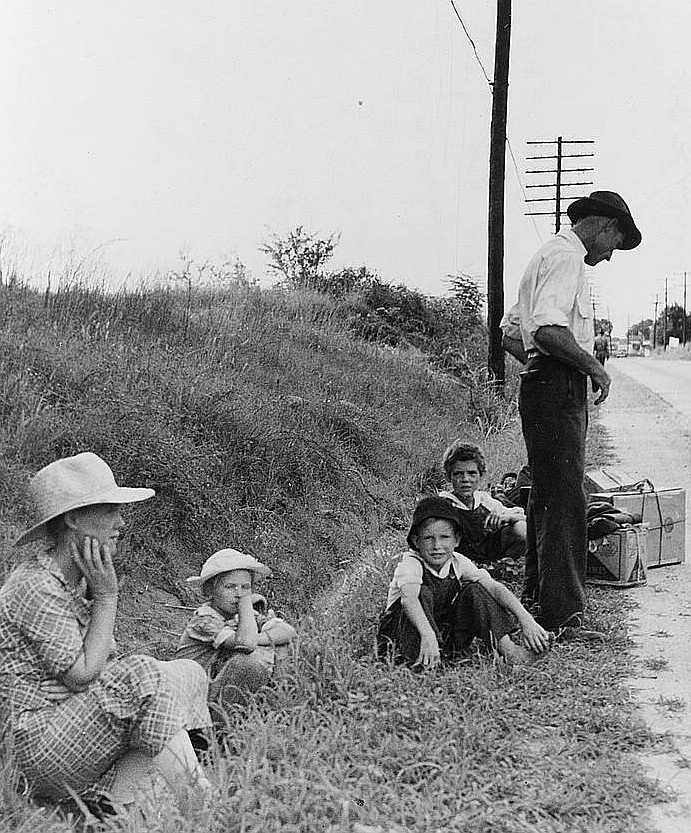
OHIO
Clay Nedblade
1931, age 16
Saw a murder in boxcar
Small bands of women in boxcars most armed with a weapon, often a stiletto
Whole families, ragged, dirty, hungry roaming the streets at all hours of day and night
Approached by gang of counterfeiters and safecrackers
Broke out of jail/ vagrancy charge.
One time walked 125 miles over mountains from San Diego to El Centro
I would pick up dimes in recreation parlors and pool halls. Some guy would put marijuana cigarettes in people's pockets and they would leave a dime. I would pick it up.
OHIO
Don Snyder
1933-1935, 15-18
“Boredom, adventure, little food and clothes at home”
Riding Union Pacific from Ogden, almost caught entering yards at Salt Lake City, where railroad bull got a quarter for each rider he caught. We would get 91 days on the rock pile if arrested.
At Arapahoe Nebraska, train stopped, pitch dark. I climbed down a bit rocky from the ride. Stepped off and fell 40 feet straight down from a bridge, hit ground, broke 4 ribs, chipped pelvis, injured kidney. Buddy went to town dance that ended at midnight; townspeople got me out.
For a while I didn’t think I’d make it. The town fathers paid for a doctor, hotel and food for five days.
It’s a terrible way to make a living. Rough and dangerous, but it does have a mystic about it. The excitement of avoiding the bulls and brakies. The sound and moan of a whistle in the silent darkness echoing through the hills. The smells of the cars. Clicking of the rails, ding ding ding of the crossings, open prairies, mountains, clear skies. For all its hardships, it has a faint longing to hit the road again. I wouldn’t do it for anything.
"I dreaded to try the door on the box car. Had they locked it? Would we suffer the same fate as the people we were told about?"
OHIO
George Rex
Runaway
Fundamentalist preacher’s son.
Each time we crossed a state line into another state, I felt like the early explorers must have felt. Mountains, rivers, cotton fields, palm trees, people with strange accents; an alien world to me, a boy from a small village in the north.
We had again traveled by freight cars to just west of Gallup, New Mexico. A large railroad trestle was being repaired near there and all trains slowed down to just a creep. We thought that we would wait until the Big Chief, the crack passenger train on the Union Pacific came along and we would board it. We would have a straight shot at Albuquerque and would save a lot of time because of switching and stops by freight trains.
We waited until the Big Chief came along. It was in the evening and when it appeared, it was being pulled by four oil burning engines. I guess the extra engines were needed for some steep grades ahead. Getting aboard the train was no problem as it slowed to a walk. We decided that the blind baggage would be the place to ride: that is the front end of the first car behind the tender.
As the train moved on, it gathered speed and was going faster and faster. As it gathered speed we became colder and colder. I would have given anything to get off the baggage car we were riding, but there was no way, unless we would jump, and that would nave been certain death. The train was traveling over 80 miles per hour, our guess.
Looking down at the rails between the cars I saw a long open tunnel full of water. I asked John what that was.
"You'll soon find out," said John.
The passenger train was designed to pick up water on the fly. They would drop a scoop in the trough and the force of the moving train would force water up into the water tender tank. This would be turned into steam to drive the oil burning engine. To add to our discomfort and cold, the overflow of the water blew back on us and drenched us through to the skin.
Oh God! How long can we stand this? Already numb from the cold and now soaking wet from the overflow of water, jumping from the train was the only way to escape our misery and suffering. We were very frightened, but kept encouraging each other to hold on for just a little longer.
After what seemed forever, we could see that we were approaching a town and a few minutes more and the engineer reduced speed. We knew that the train would pull right up to the passenger station and that we would have to leave fast to avoid railroad detectives. I chose the right side as my exit. A poor choice that turned out to be.
I jumped from the train before it had completely stopped and could hardly keep up with my legs. Next thing I knew, I had ran right into the arms of a railroad cop. "What are you doing riding a passenger train?" he asked. Out of breath and running so fast, I denied riding the train. My denial did me no good.
I was arrested and taken to the Albuquerque police station. "What is the charge?" the police officer asked. "Riding a passenger train" replied the railroad detective. "Are you guilty?" asked the police officer. "No" I replied. "I was only at the station to meet a friend."
The police officer said "Son, take a look at yourself in that mirror on the wall." As I turned to look in the mirror I knew I must admit my guilt.
I was treated kindly and given a warm place to sleep that night in Albuquerque jail.
One evening in Bakersfield, we talked to some fellow freight train travelers and they warned us that if we were traveling east that we should be careful. The Union Pacific was putting many empty railroad cars in storage. They were no longer needed because of the economic slow-down and so they were run off on sidings in the desert. Stories were told to us about people being locked in box cars and dying of thirst and hunger before they were found.
A train moving east soon came along. We chose an empty box car for our accommodations. It was in the evening and we remembered the warning given us. We would take turns sleeping and if the train stopped to sidetrack cars, we would be aware of it. If the one we were in should be left for storage, we would move to one that was to continue on east.
John and I, still tired from the little rest we had the night before, settled down for the trip across the Mojave Desert. John would stand the first watch while I slept.
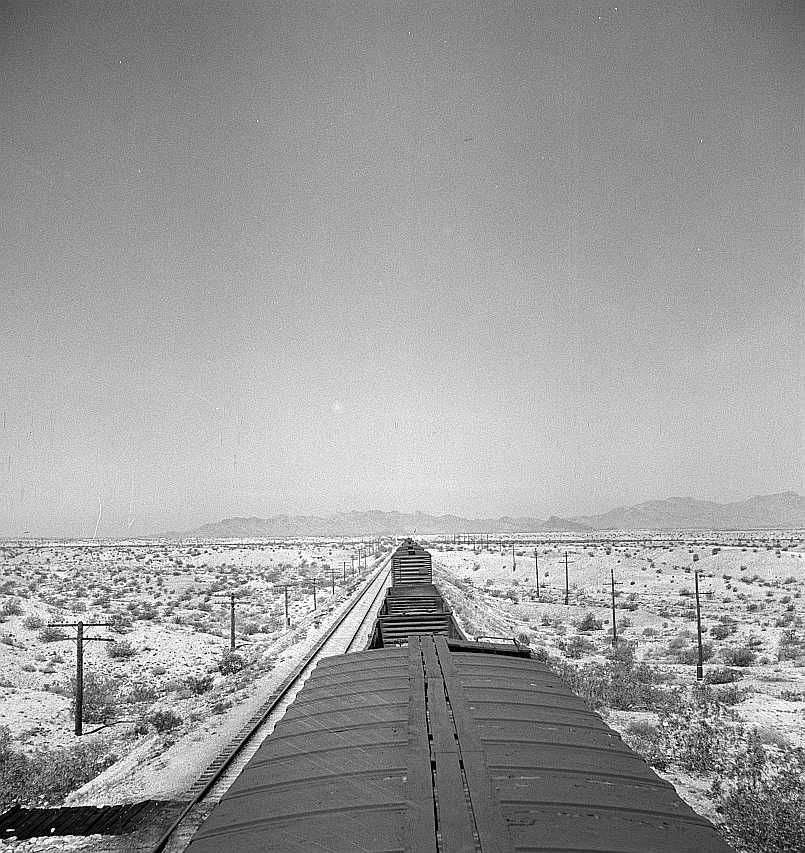
Many hours later I awakened to find the train no longer moving and John sound asleep. Sure enough, we had been left behind. I dreaded to try the door on the box car. Had they locked it? Would we suffer the same fate as the people we were told about? We both rushed to the door.
Thank God! It was not locked and we moved it open. Sure enough we were somewhere on the desert with no signs of life except the howling of coyotes. It was a beautiful clear night and as I looked up into the sky, the stars seemed so close that they could be touched. I wondered how I could appreciate the beauty of the heavens when we were in so much danger.
Nights on the desert can be very cold and days very hot at this time of year. We found some heavy paper that had been used to line the interior of the box car and built a fire to keep warm. We were thankful for the paper and there was enough of it to keep a fire burning.
Daylight we decided to follow the rails east. We believed that would be our best chance of being found, perhaps by another train. The walk at first was not difficult, but as the sun rose higher in the sky, so did the temperature on the sands. It suddenly occurred to us that we had not had a drink of water since yesterday and the hotter the sun, the more we became aware of our thirst. Stories and movies came to mind of people dying of thirst on the desert.
We continued walking, stopping only for a few minutes in the shade of a billboard to try and cool ourselves. The only shade was the signs along the track. Ironically, Coca Cola in a tall glass with ice was one of the signs. It added to our misery.
I don't know how long one can live without water. I know that, it is far more important than food. At least we were thinking about water all the time. At times we would see desert mirages ahead. At first we thought we really did see lakes, only to find it was the sand glistening in the bright sun.
For the first time, John and I started arguing. All that we had been through together up until now had kept us good friends. I guess the heat and thirst was now more than we could handle. I blamed him for sleeping and causing all the suffering and perhaps our deaths. He would get angry each time I told him I could see water ahead. "Don't you know yet what a desert mirage is?" he shouted. "There will be no water unless someone finds us."
Ahead of us we could see some small hills and as we struggled on toward them, I again said I see water ahead. After walking miles we did find a small stream of water coming out of the hills. The water was dirty and full of sheep dung, but both of us brushed aside the dirt and sheep manure and thought it the best water we ever drank.
The desert was cooler now as evening approached and we both now had a little hope that since we found water and evidence of sheep that just maybe, we would find help from some sheep herder.
Finally as we got closer to the hills, we started seeing some green cover on the desert sand near the little stream of water, and soon we did meet a man tending his sheep. The shepherd gave us some food and water. We were told that if we followed the tracks east, we would come to a small settlement. Our bodies soon strengthened with the food and water and we made it to the little town. John and I both thought we would never escape this experience alive, but we were spared far more suffering and danger ahead.
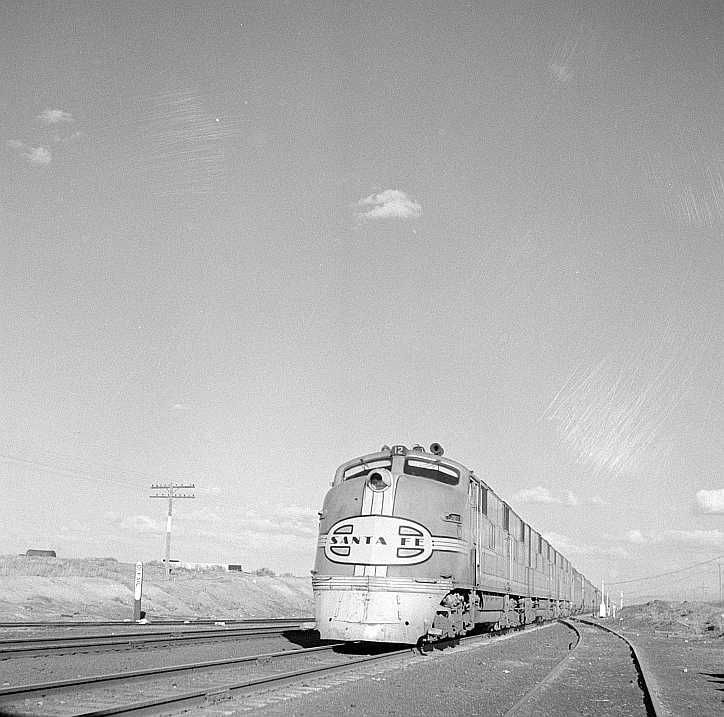
OHIO
Glenda Emlenger
We lived in a small Pennsylvania town, half a block from the tracks. We knew we were marked as an easy target as my Mom was one of the kindest, most caring persons I knew. With seven children she was also a miracle worker having food for us kids.
It was early winter with no jobs to be had. My Dad had walked the streets looking for any kind of work to no avail.
We had a little chicory coffee and some bread. One day a young man came to the door asking for a handout. My mother felt so bad she couldn’t help. When she told him she had only enough for us kids. The man kept saying save it for the children; save it for the children, and then left.
Later we would find food left on our porch. A slab of bacon, a sack of cornmeal, which I knew was for the bos as we called them.
I still have a soft spot in my heart for those people and I remember them well.
OHIO
John Brown
age 13-17, 1934-1938
Picked up for vagrancy in Washington, DC. Waiting in jail. They electrocuted a man while I was there. Went down to eat. You could still smell the scorched thing. Many older guys just gobbled up food, us younger guys couldn’t eat. Heard the guy holler, smelled the burned flesh.
Riding boxcars in Mississippi and Alabama. Kids with poles and tin cups nailed to the top. You put in 5 cents and the kids would give you an oyster or crab meat sandwich.
It was a great experience for me. I’ll never forget, as old and cynical as I am now, how many people were kind. If you have to be down and out, this is by far the best country to be in. I’ve been in 47 other countries; believe me when you’re flat broke you’ll make out in America better than anywhere else like Italy or France.
OHIO
John Kercsi
First time catching out fell and then helped by one-armed hobo grabbing the ladder with the stump of his left arm.
Beaten by BIG RED, Texas bull
In Georgia, I got off a freight train and saw a farm house. I went there to ask for food and the farmer asked if I would like to work and I asked how much. He said $1.75.
I accepted and I had to get up at 4.30 and work till 8, have breakfast and then go on and work till night fall.
At the end of the week he said he didn’t need me any more and handed me $1.75. I told him I thought he said $1.75 a day.
He started yelling and swearing at me and told me I socialized with his black help. I played cards with them in their shack a couple of nights that week.
While I was waiting for my freight to Florida, one of the black young men came up to me and sneaked me some food wrapped in newspaper for me to take on my way and then quickly departed.
OHIO
Leonard Wells
Age 16-21, 1930 onward
I was riding the blinds in Georgia and discovered that the coach door was unlocked and empty.
There were huge cigarette and cigar butts. We drained all the whiskey, rum and scotch bottles into one. We smoked cigars, got drunk while riding the cushions.
We decided the coach was or had been occupied by politicians. No one else could afford it.
I watched the chain gang work along the railroad, breaking up rocks. We called it making little'ins outta bigg'ins.
I was scared to death. I knew if I was caught that’s where I would end up.
OHIO
Michael Lonkerd
August 26, 1932
Diary:
This ride took me to Cedar Falls. There’s a fair going on, also there is going to be a train wreck that will take place on an old rail road siding a short distance from the fair.
There are two steam engines on this track and each one is on the opposite end of the track. They are getting a full head of steam, the people are being moved so that no one will be hurt by some of the pieces of the wreckage from the crash. There is just one engineer in each engine. There is a distance of about 1 1/4 miles between the two engines.
There are two red lights at each end of the track which will the signal to push the throttles all the way to full speed ahead, and then they will leave the two engines which will send them roaring full speed towards each other, boy what a sight that is going to be.
The black smoke is being pushed up out of smoke stacks like a huge geyser. The two red lights have come on, the engineers have set the throttles and are leaving the engines, The engines will be going about 40 or 50 miles an hour, because they will not be pulling any freight cars. When they meet head on it will be a crash force of about 80 to a hundred miles an hour. Boy what a sight that is going to be.
Here they come! CRASH! BANG! What a terrible noise it is, one of the whistles opened and stayed open full blast open for about 30 seconds. The two trains looked like a huge pile of steel welded together after the wreckage settled.
I didn’t go to the fair because I had very little money and I didn’t feel like spending what little I had foolishly. I am ready to hit the road again.
OHIO
Milton McKee
As you traveled east after the Crash, the Depression was felt to the greater degree. Farmers lacked electricity so radio communication was poor and market prices were behind what was happening in the east. I remember it seemed the better part of a year before the Depression was felt in west to extent that it hit the east.
OHIO
Opie C. Cobb
I left Fort Worth, TX in the fall of 1931 headed for West Virginia. I had 15 cents in my pocket.
That was in the early part of the Great Depression, I went for three days without eating. I just hated to start begging but I knew if I made it home to Charleston, West Virginia, I was going to have to start knocking on some back doors.
When I first started knocking on back doors, I would ask them if they had any work I could do to get something to eat. They would say no and close the door. After a dozen failures, I decided I was going to have to change my tactics.
I would ask for something to eat. Then after they gave me something to eat, I would offer to work to pay for it. Very seldom would I have to do any work.
But I sometimes chopped wood, mopped floors, washed dishes, you name it, I probably did it.
Instead of taking the short way which would have been 1,500 miles, I decided to come by way of Florida which was about 2,500 miles.
I started with 15 cents, traveled about 2,500 miles in 12 days, once in a while I slept in a bed but sometimes I would just get out in the weeds and go to sleep, sometimes in a barn, once under a country church.
I arrived in Charleston with a nickel out of my 15 cents.
When I was working the grain harvest, after I would finish one job, I would hitchhike until almost dark, then I would get out in the grain field. I would lay bundles of grain in rows about six feet long, then I would put two bundles on each side. Then I would lay bundles cross-ways across the bundles on the sides. Then I would slide down under the top bundles and pull a bundle over the opening. You may ask about snakes? I decided they could take care of themselves.
OHIO
Ralph Shelly
A book gift on the road: “Adventures in Contentment by David Grayson, 1906"
“Let me see your hands,” she said. This was a common procedure. The police often used it. It was a means of separating the sheep from the goats; that is the hoboes from the bums. If your hands were pink and smooth, obviously you were a bum and never worked. If your hands were rough and callused, you were a hobo.
The woman was apparently satisfied. “Let’s see how good you are at digging potatoes,” she said.
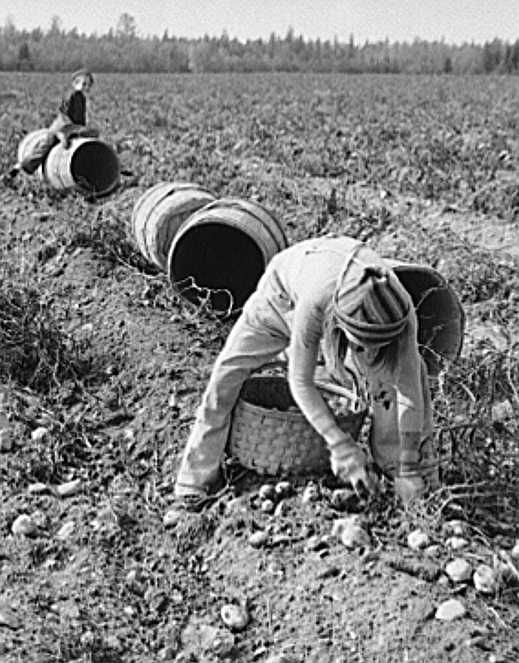
OHIO
Robert Chaney
I was 17, one of 10 children and out of a job. My father said to me, ‘If I was a strong, healthy boy like you, I wouldn’t hang around here and eat off my old man. I would go to California."
I knew he figured that would be one less mouth to feed.
My mom packed me a big lunch and fried green tomatoes and peanut butter and gave me 50 cents.
We left the next evening from Wadsworth, Ohio on the first freight heading west.
“We were just two country boys, too young and naïve to be afraid. It was a great adventure for us.”
“Our first big stop was in St. Louis, where it was very hot. I took off my jacket while eating lunch in the park; when we left I forgot my jacket but figured I wouldn’t need it in California so I didn’t go back for it.
Evening came and it turned very cold so we went into the sand house and buried ourselves in the warm sand. In a little while we came out jumping and beating ourselves. The sand fleas nearly ate us alive.
While we were in Delhart, Texas, we were warned about the tough railroad detective Texas Slim. There were six of us so we figured he couldn’t hurt all of us at once so we started to hop a freight.
We heard a “Hey you Bo’s” and there he was, all 6 feet 7 inches of him, waving two six guns. You have never seen six men scatter so fast as when he shot those guns.”
OHIO
Samuel Galloway
Often they slept with their shoes tied around their necks to make sure they wouldn’t be stolen from their feet. They wouldn’t sleep in the wretched hobo camps along the way because of the things that went on inside, murders, drunkenness and body lice. One of his favorite places to sleep was behind billboard signs, since they provided good shelter from the rain.
OHIO
Wallace Horton
As I passed through the mountains of WYO, CO, ID, OR, WA I often thought about what my mother and father had gone through, going through these same mountains as they went west in a covered wagon. I saw great numbers of families going west with all their belongings tied to a model T.
OHIO
William Pion
1939, age 19
“No one can ever appreciate coffee until having some brewed over a fire in an old tin can. It never tasted so good.”
“I was hauled out of a reefer ice hatch and belted a couple after being told of others getting locked in and being found weeks later with stubs of worn down fingers, dead.”
'Saw hundreds of Okies and Arkies living in dry gulches in old Flivvers or under bridges, some naked, washing in puddle, all looking so miserable that I felt lucky to be moving on.”
One night, riding on front of a gondola, a man flew over my head and down between cars to the rails to his death. He had been stalking me as I knew he was wanted for robbery and murder of gas station man. Acquaintance of mine had hurled him out of empty gondola, which saved my life. He had a razor.
At Fresno, a parade for Townshend “thirty dollars every Thursday” had a recruiter. If I voted for Townshend for president, I would get a voucher for a free ham and egg meal. I lied about my age to get the food and got on the voters list.”
